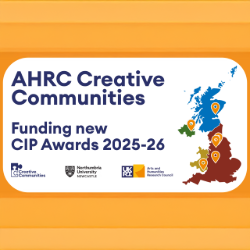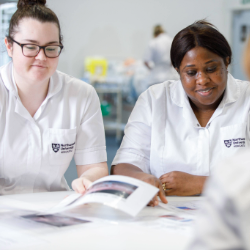-
Study
-
Undergraduate
- UCAS Clearing & Confirmation 2025
- Application Guides
- UCAS Exhibitions
- Foundation Years
- School & College Outreach
- Information for Parents
-
Postgraduate
- Application Guide
- Postgraduate Research Degrees
- Flexible Learning
- Change Direction
- Register your Interest
-
Student Life
- Students' Union
- The Hub - Student Blog
- Accommodation
- Northumbria Sport
- Support for Students
-
Learning Experience
- Real-World Learning
- Research-enriched learning
- Graduate Futures
- The Business Clinic
- Study Abroad
-
-
International
International
Northumbria’s global footprint touches every continent across the world, through our global partnerships across 17 institutions in 10 countries, to our 277,000 strong alumni community and 150 recruitment partners – we prepare our students for the challenges of tomorrow. Discover more about how to join Northumbria’s global family or our partnerships.
View our Global Footprint-
Quick Links
- Course Search
- Undergraduate Study
- Postgraduate Study
- Information for Parents
- London Campus
- Northumbria Pathway
- Cost of Living
- Sign up for Information
-
International Students
- Information for International Students
- International Events
- Application Guide
- Entry Requirements and Education Country Agents
- Global Offices
- English Requirements
- English Language Centre
- International student support
- Cost of Living
-
International Fees and Funding
- International Undergraduate Fees
- International Undergraduate Funding
- International Masters Fees
- International Masters Funding
- International Postgraduate Research Fees
- International Postgraduate Research Funding
-
International Partners
- Agent and Representatives Network
- Global Partnerships
- Global Community
-
International Mobility
- Study Abroad
- Information for Incoming Exchange Students
-
-
Business
Business
The world is changing faster than ever before. The future is there to be won by organisations who find ways to turn today's possibilities into tomorrows competitive edge. In a connected world, collaboration can be the key to success.
More on our Business Services -
Research
Research
Northumbria is a research-rich, business-focused, professional university with a global reputation for academic quality. We conduct ground-breaking research that is responsive to the science & technology, health & well being, economic and social and arts & cultural needs for the communities
Discover more about our Research-
Quick Links
- Research Peaks of Excellence
- Academic Departments
- Research Staff
- Postgraduate Research Studentships
- Research Events
-
Research at Northumbria
- Interdisciplinary Research Themes
- Research Impact
- REF
- Partners and Collaborators
-
Support for Researchers
- Research and Innovation Services Staff
- Researcher Development and Training
- Ethics, Integrity, and Trusted Research
- University Library
- Vice Chancellors Fellows
-
Research Degrees
- Postgraduate Research Overview
- Doctoral Training Partnerships and Centres
- Academic Departments
-
Research Culture
- Research Culture
- Research Culture Action Plan
- Concordats and Commitments
-
-
About Us
-
About Northumbria
- Our Strategy
- Our Staff
- Our Schools
- Place and Partnerships
- Leadership & Governance
- University Services
- History of Northumbria
- Contact us
- Online Shop
-
-
Alumni
Alumni
Northumbria University is renowned for the calibre of its business-ready graduates. Our alumni network has over 250,000 graduates based in 178 countries worldwide in a range of sectors, our alumni are making a real impact on the world.
Our Alumni - Work For Us
What will I learn on this module?
Business tourism and events is a key segment of an ever-evolving industry, and through strategic planning, organisation and management, the segment continues to be an important focus in destination planning. In this module you will develop both a critical and practical understanding of this growing sector of tourism and events management.
The module is based on three key areas of business tourism and events: structure, management and environment.
First, you will learn about the range and reach of business tourism, focussing primarily on the structure of the MICE industry (meetings, incentive travel, conferences/conventions and exhibitions). You will examine the nature and scope of the MICE industry from a national and international perspective. You will also learn how to develop management strategies for the effective planning and management of MICE events.
Second, you will develop specialist knowledge of the latest management strategies, including planning, implementation, operation and control of business tourism and events.
Thirdly, you will explore the dynamic environment of business tourism and events by understanding the latest issues and future impacts within the business tourism segment.
The learning in this module seeks to equip you with the skills of intellectual autonomy and collaborative working through critical and strategic inquiry. By examining real life situations through debate, discussion and active engagement, you will identify and explain key operational quality issues as well present and potential impacts.
How will I learn on this module?
You will learn through lectures, seminars and both directed and independent learning. The lectures will provide you with a theoretical underpinning of the module content, relating theory to practice through an extensive use of case studies. Guest lectures will be incorporated into the module delivered by event practitioners to allow you to learn through debate, discussion and active engagement. This is reflected in the assessments being a group presentation and an individual report.
You will be supported in seminars that will enable you to tackle a series of guided exercises with continuous assessment and feedback. You will be expected to keep up to date with the seminar activities. Independent time is set aside for you own learning and reading activities.
The learning seeks to equip you with the skills of intellectual autonomy, collaborative working, critical and independent inquiry.
How will I be supported academically on this module?
A member of academic staff will lead the module and provide lecture input; other academics will also contribute to and support Business Tourism and Events, based on their subject expertise. Tutors will guide you through exercises during timetabled sessions. Support will include feedback from tutors during small-group seminars.
Your module is supported by the University’s eLearning Portal which houses lecture materials and seminar exercises alongside assessment details and various support facilities such as the recording of certain lectures, messages and the discussion board provide and interactive element for group benefit.
You will be provided with a wide-ranging electronic reading list that comprises of various academic reports, books sections and journal articles that contributes to the understanding of concepts and ideas. The support will be increasingly aligned towards to co-creation of knowledge, and active self-directed learning on your part. These approaches allow for engagement with higher academic levels of inquiry and research.
Your module assessment consists of a group presentation and an individual report; specific time will be allocated in class to support the assessment.
What will I be expected to read on this module?
All modules at Northumbria include a range of reading materials that students are expected to engage with. Online reading lists (provided after enrolment) give you access to your reading material for your modules. The Library works in partnership with your module tutors to ensure you have access to the material that you need.
What will I be expected to achieve?
Knowledge & Understanding:
• Develop a critical understanding of business tourism and events, which recognises its significance and contribution to the tourism economy. (MLO1)
Intellectual / Professional skills & abilities:
• Demonstrate ability to research specialist issues in business events management and resulting business tourism, making informed recommendations based on evidence whist recognising potential innovations in practice. (MLO2)
Personal Values Attributes (Global / Cultural awareness, Ethics, Curiosity) (PVA):
• Develop a responsible approach to learning, business and management that is underpinned by ethical values. (MLO4)
• Develop and critique appropriate management strategies for the planning, implementation, operation and control of business tourism and events. (MLO4)
How will I be assessed?
You will be assessed within 2 summative components. A group presentation which covers 20% of the mark (MLO 2 and 4) and an individual report which counts for 80% of the mark (MLOs 1-4)
On an ongoing basis your tutors will give feedback on the seminar exercises, formative assessments are embedded within the seminars to support and assist in the co-creation of knowledge and to prepare for the summative assessments.
This will encourage active participation in the learning process throughout the semester. Your tutors will be looking for you to develop the ability to investigate and analyse Business tourism and events, and to apply strategic principles to real life situations.
Pre-requisite(s)
N/A
Co-requisite(s)
N/A
Module abstract
Business tourism is an exciting industry to be part of – and it’s growing. In this module, you’ll develop both the strategic and academic insights you need to operate successfully in the MICE (meetings, incentives, conferences/conventions and exhibitions) sector. You’ll develop specialist knowledge of the latest management strategies for the planning, implementation, operation and control of business events, which
you’ll subsequently apply to real life situations through case studies and assessments. We’ll encourage you to develop a strong awareness of current issues and trends, including technology-led events, as well as an ability to evaluate future demand and how the industry will continue to evolve both nationally and worldwide. This is the perfect grounding for a future career in a fast-paced, global industry.
Course info
UCAS Code N805
Credits 20
Level of Study Undergraduate
Mode of Study 3 years Full Time or 4 years with a placement (sandwich)/study abroad
Department Newcastle Business School
Location City Campus, Northumbria University
City Newcastle
Start September 2026
All information is accurate at the time of sharing.
Full time Courses are primarily delivered via on-campus face to face learning but could include elements of online learning. Most courses run as planned and as promoted on our website and via our marketing materials, but if there are any substantial changes (as determined by the Competition and Markets Authority) to a course or there is the potential that course may be withdrawn, we will notify all affected applicants as soon as possible with advice and guidance regarding their options. It is also important to be aware that optional modules listed on course pages may be subject to change depending on uptake numbers each year.
Contact time is subject to increase or decrease in line with possible restrictions imposed by the government or the University in the interest of maintaining the health and safety and wellbeing of students, staff, and visitors if this is deemed necessary in future.
Useful Links
Find out about our distinctive approach at
www.northumbria.ac.uk/exp
Admissions Terms and Conditions
northumbria.ac.uk/terms
Fees and Funding
northumbria.ac.uk/fees
Admissions Policy
northumbria.ac.uk/adpolicy
Admissions Complaints Policy
northumbria.ac.uk/complaints








